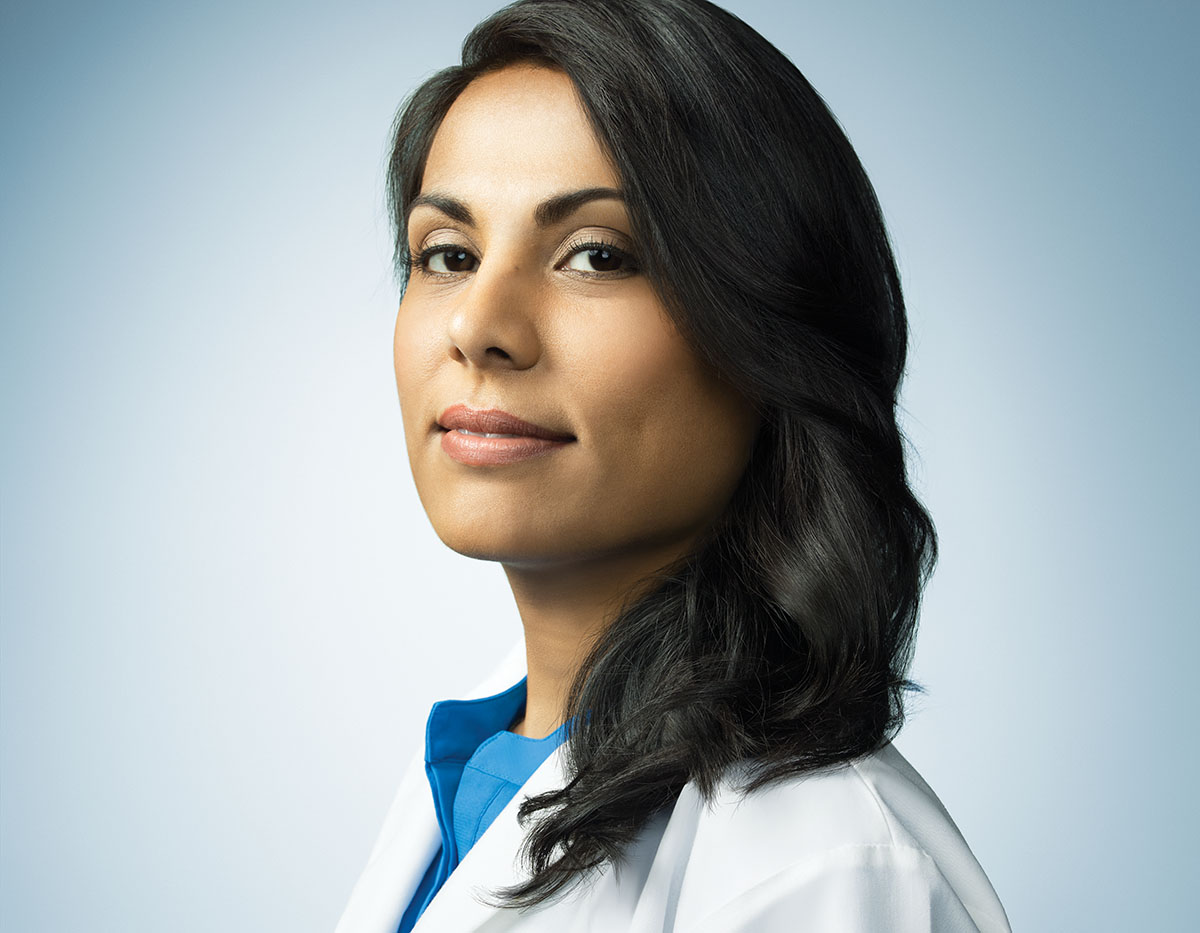A Boston Doctor vs. Ebola

photograph by david yellen
What Nahid Bhadelia remembers most from her trip to treat Ebola patients in Sierra Leone—12 days of working with desperately ill people in a country where the disease has killed thousands—is not being able to touch her patients.
“There were so many children who lost all their family, and they were in those units alone, some of them under five years of age,” she recalled. “You want to reach down and really comfort them, but all they can see is your eyes. You’re completely covered. You want to pet them, you want to caress them, but you have double gloves on.”
An epidemiologist at Boston Medical Center, the Brookline-raised Bhadelia, 37, has spent the past few years designing emergency protocols for Boston University’s controversial planned Level 4 lab. The National Emerging Infectious Diseases Laboratories would allow BU to study deadly viruses like Ebola in a controlled environment—a very different situation than the one Bhadelia faced in Sierra Leone, dealing with a fast-moving pandemic.
“It was physically grueling. [We] were throwing back Gatorade, Tang, and water,” says Bhadelia, who lost six pounds during those 12 days. “It’s so tough physically, but also emotionally. As physicians on this side of the ocean, we are not used to losing so many of our patients.”
We spoke to Bhadelia on the eve of her return to Sierra Leone. She has a third trip scheduled for January.
What was your first impression of Sierra Leone?
When I was landing, the first thing I noticed was how green everything was. You know, Liberia and Sierra Leone are so lush, the rainforest, they’re just beautiful. And it’s funny, the very diversity of life there is kind of what breeds all these emerging pathogens, right? There’s a ton of life there.
Freetown is such a vibrant city. On the surface, you may not see anything obvious because people are still going about their business. But you start noticing the little changes in the way people behave. They aren’t touching each other; they’re not reaching out. When we landed, I reached out to shake my driver’s hand, and he folded his hands and gave me a kind smile. And I was like, Oh, right. How easy it is to forget that, because it’s part of our human nature to reach out and touch someone.
Then the other things you notice are that every single public building, like banks, shops, they have bleach water buckets with briquettes, so you have to wash your hands with bleach before you go in, and there’s someone outside the door taking your temperature.
So everything smelled like bleach?
The whole trip, for me, the memory is heat and bleach. And every once in a while the smell of fresh rain, because it was the rainy season.
How did you end up there?
My focus, in particular, is on those infections that are emerging—ones that we don’t have a lot of experience with. How do we track them? How do we take care of patients with them, as we ourselves are learning about the disease?
George Risi, my [colleague], called me and said, “I have a proposition. Do you want to go to Sierra Leone?” And I said, “Yes, of course.” The reason we both wanted to go so badly, aside from the humanitarian imperative, is that we were supposed to be the experts in taking care of patients with Ebola and none of us has ever seen a patient with Ebola.
What does an Ebola patient look like?
Ebola is a disease that we’re not very familiar with, and people have this overdramatized idea of what patients with Ebola look like. But they’re just really sick patients. And the only difference is there aren’t enough people there to help.
While we were there, we lost two nurses to Ebola, two local nurses. We lost one ambulance driver and two lab technicians.
There was a Liberian minister, who was on NPR on a show that I did, and he was talking about how this disease is anti-love. It’s a disease that basically impacts those who are caretakers, those who provide hands-on care for the sick, or healthcare workers who are reaching out to heal people.
As we speak, you’re preparing to go back. How did your family feel about you being there this summer?
My parents were so supportive, and I know that wasn’t easy for them. And I said to my father last night, “Are you okay going through this again?” And he said, “We’re all in this together.”
And that’s how they always made me feel. We’re all in this together.

